The saying goes if you love what you do, you’ll never work a day in your life — as if “work” is somehow something to be avoided. Before we read Philip Levine’s poem, I ask students, “What is work?” and someone always replies with some variant of that quote. I want to tell them it’s a lie, for two reasons: first, no matter how much you love your job, there are times when you don’t when it becomes “work” in the negative sense of the term; second, “work” should almost never have a negative sense, if you know what work is.
We stand in the rain in a long line
waiting at Ford Highland Park. For work.
You know what work is—if you’re
old enough to read this you know what
work is, although you may not do it.
Forget you. This is about waiting,
shifting from one foot to another.
Feeling the light rain falling like mist
into your hair, blurring your vision
until you think you see your own brother
ahead of you, maybe ten places.
You rub your glasses with your fingers,
and of course it’s someone else’s brother,
narrower across the shoulders than
yours but with the same sad slouch, the grin
that does not hide the stubbornness,
the sad refusal to give in to
rain, to the hours of wasted waiting,
to the knowledge that somewhere ahead
a man is waiting who will say, “No,
we’re not hiring today,” for any
reason he wants. You love your brother,
now suddenly you can hardly stand
the love flooding you for your brother,
who’s not beside you or behind or
ahead because he’s home trying to
sleep off a miserable night shift
at Cadillac so he can get up
before noon to study his German.
Works eight hours a night so he can sing
Wagner, the opera you hate most,
the worst music ever invented.
How long has it been since you told him
you loved him, held his wide shoulders,
opened your eyes wide and said those words,
and maybe kissed his cheek? You’ve never
done something so simple, so obvious,
not because you’re too young or too dumb,
not because you’re jealous or even mean
or incapable of crying in
the presence of another man, no,
just because you don’t know what work is.
We finish the poem in class, and a young lady with tight curls and a sweet smile says, “This is the first poem in your class that I actually understand.” Apparently, all the other poems have been too much of a struggle. I like a struggle in my classroom. When students struggle, they learn. But if they’re struggling with a job for which they’re not really prepared, it’s not really productive struggle, just struggle for the sake of frustration. Perhaps this was a bit of productive struggle for her.
I return home to find E helping clean the house.
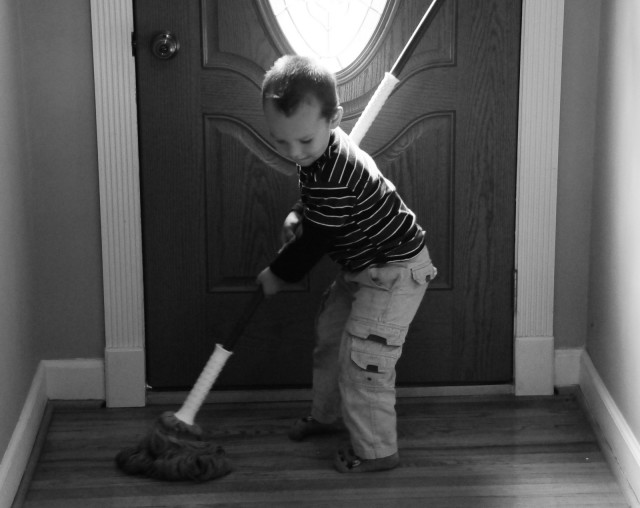
He absolutely loves doing anything an adult is doing, so when he sees someone working, he wants to join in. Even when the job is too big for him, like ringing out the mop before slopping it down on the hardwood floor.
“Honey, honey, you have to let me do that. You’re not strong enough to do it well,” K says, in Polish — understanding her would have been work for me twenty years ago, when I was about to head off to Polska and could only say “please” and “thank you” and count to ten — sometimes thirteen or even fourteen if my memory worked. For E, it’s nothing. Speaking Polish is still a struggle, for everyone in the family, truth be told, except K. But it’s productive struggle. Frustrating struggle — my tongue couldn’t get around “wykształcenie wyższe” the other evening when, as I often do, I was quoting Miś.
When the Boy finishes, he still wants to clean, so we take him to the carport cum covered porch and let him work some more.
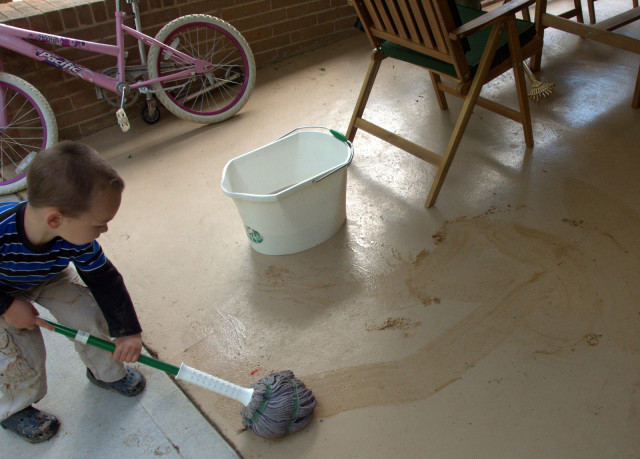
He makes a mess in order to clean it up.
Or sometimes he just makes a mess, as when he’s playing in the mud. His sister informs me, “We’re making mud cement.” Work.
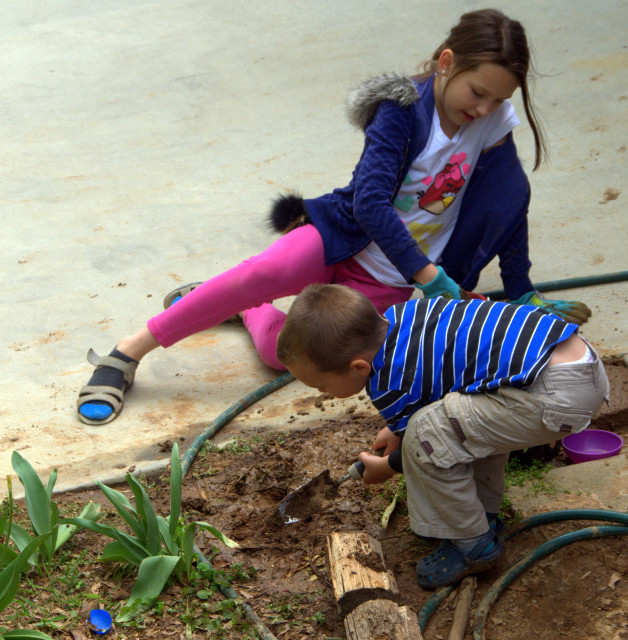
When it’s dinner time, the Boy insists on helping again. We’re having Chinese stir fry, so he’s thrilled to get to stand at the pan and stir everything, and he’s especially amused by the fact that we’re adding a glob of peanut butter to veggies, suggesting that perhaps we might want to add some jelly as well.
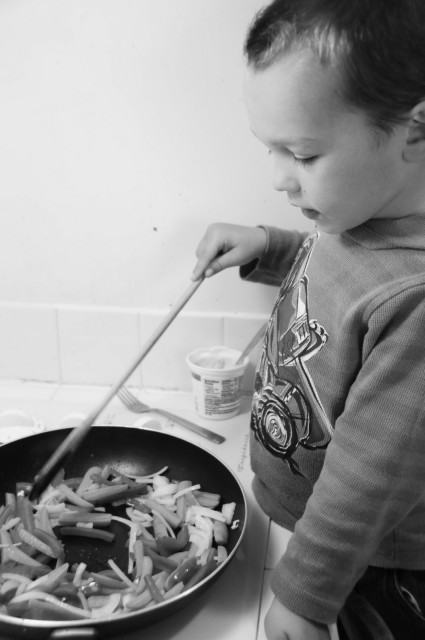
We have a friend who’s a chef who in theory does this all day long. So for him, is it work?
After dinner, a neighborhood kid comes around, and E play around at soccer. There’s no temptation to ask him questions like, “Would you like to be a professional soccer player?” because soccer for him is just one of many little diversions throughout the day.
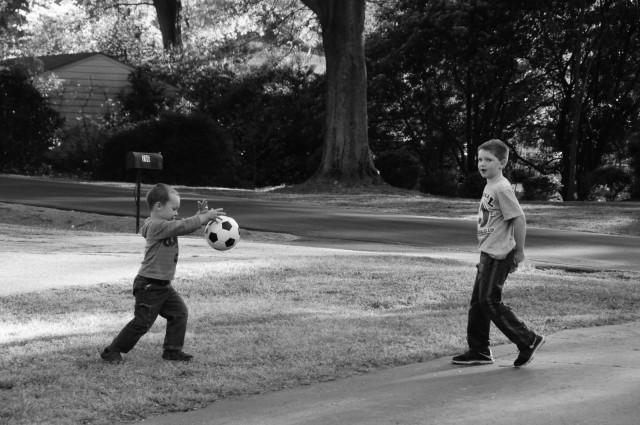
If he was a pro, would that make soccer work? And why is “work” something we want to avoid? Do we know what work is?
In 1981, Pope John Paul II published the encyclical Laborem exercens, “On Human Work.” He takes a common sense approach to defining the word:
[W]ork means any activity by man, whether manual or intellectual, whatever its nature or circumstances; it means any human activity that can and must be recognized as work, in the midst of all the many activities of which man is capable and to which he is predisposed by his very nature, by virtue of humanity itself.
So anything can be work. But he makes a distinction between work and toil.
For the Boy and the Girl, it often depends on motivation.
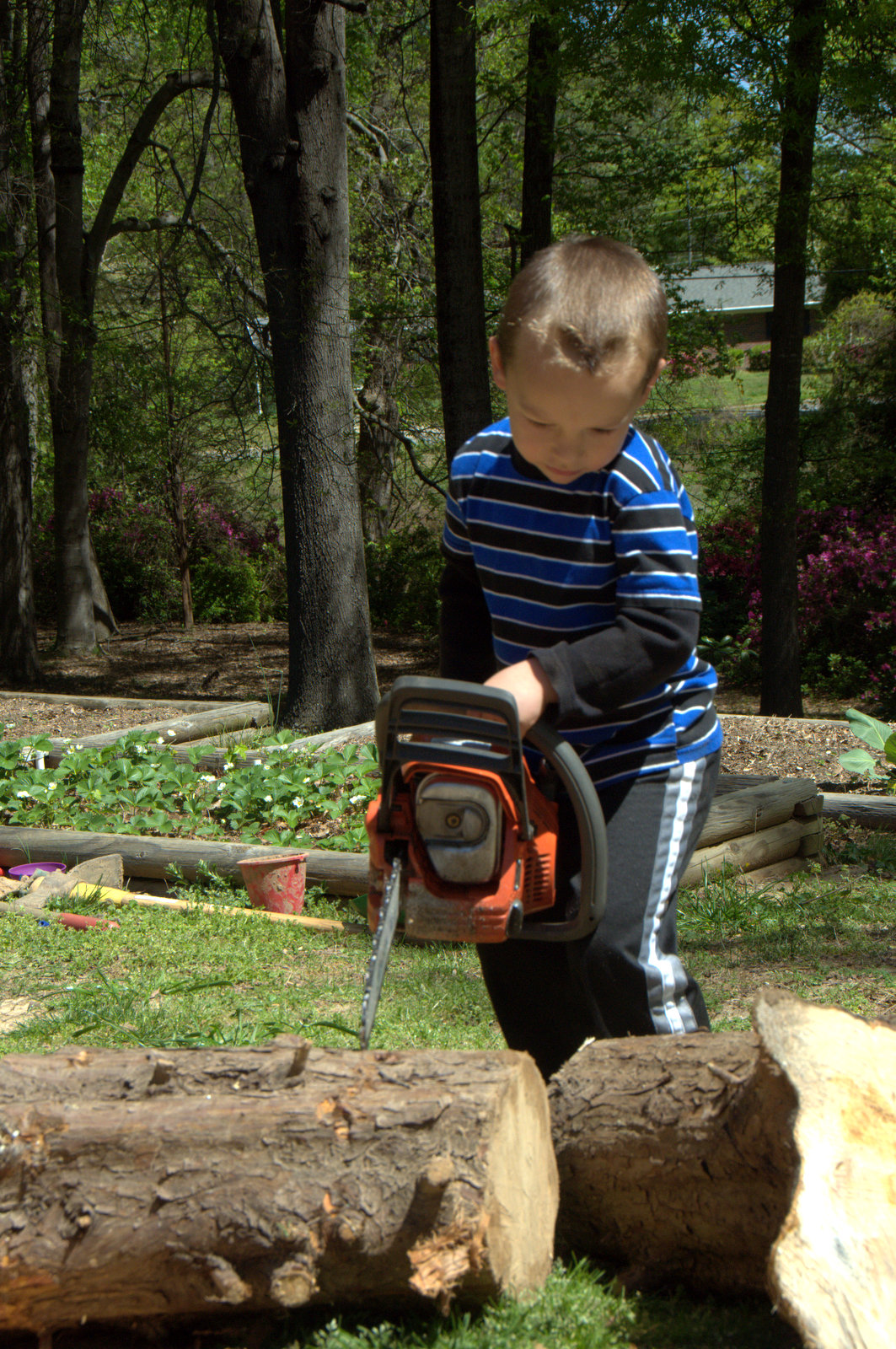
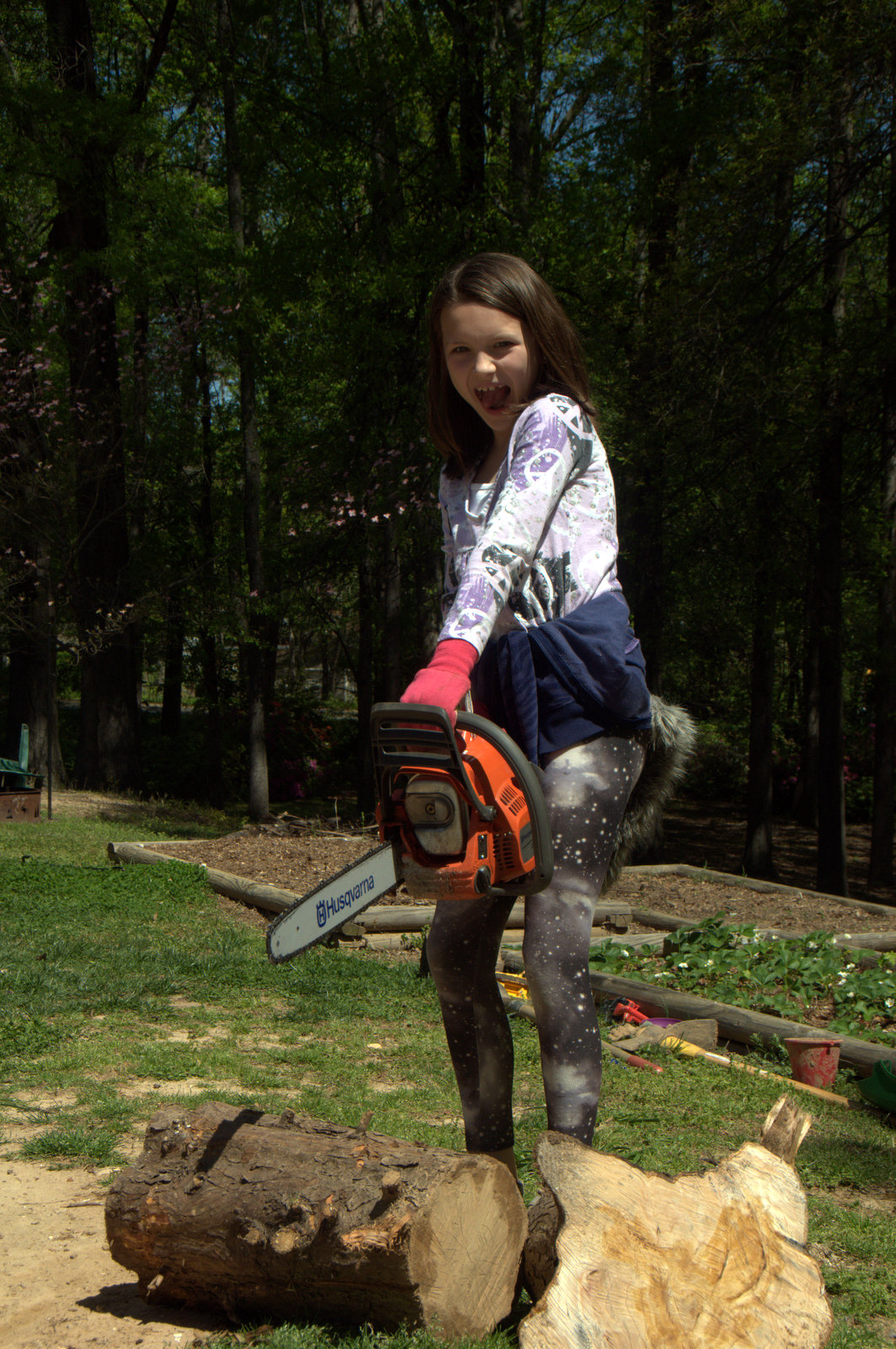
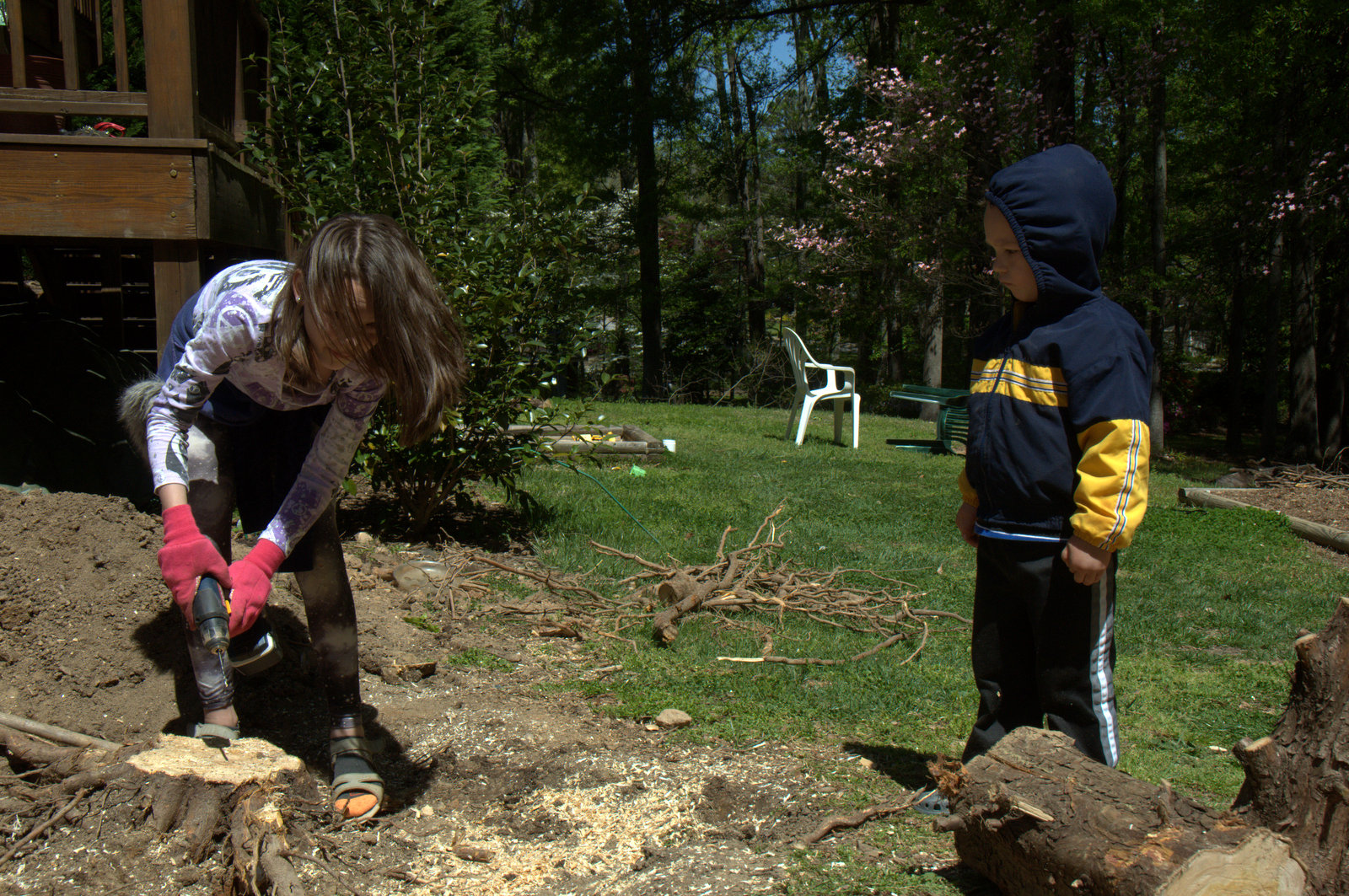
0 Comments